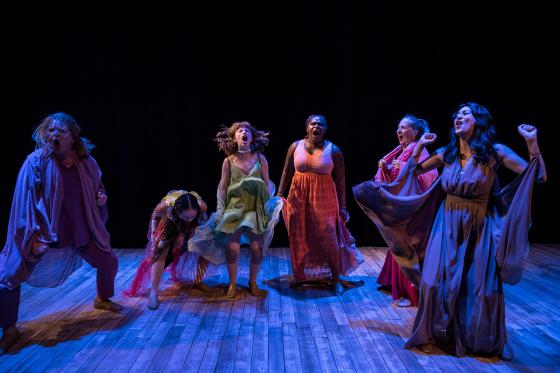Though the prominence of the word “pussy” may be a pivotal part of the play Dance Nation, it’s far from the only aspect that audience members have found divisive. There’s also the show’s frank talk of sexuality, and its graphic depictions of masturbation and menstruation.
In a way, it’s understandable that some might find such material off-putting. For this reason, we suggest that all of our prospective audience members review our content guidance page before they purchase any Olney Theatre tickets.
But before dismissing this pussy-centric material as a simple stab at shock value, it is worth considering whether these portrayals should be shocking at all. After all, though both menstruation and sexual self discovery are relatively universal parts of puberty for pussy-possessors, both still remain shrouded in shame and stigma, which can have real and serious consequences for women’s self-conceptions and reproductive health.
Take the “masturbation gap”— a term that refers to the fact that, while the vast majority of women do masturbate, the percentage of men who masturbate tends to be significantly higher. One study put women at 88 percent vs men’s 96, and others have found significantly greater disparities.
Data indicates that men typically begin masturbating at a younger age than women and masturbate far more frequently than women, nearly twice as many times a month. Meanwhile, women are more likely than men to report having lied about or felt ashamed of their masturbatory habits, feeling less comfortable discussing them, and having more difficulty coming to accept masturbation as a normal and healthy thing to do.
To some, this suggests that the gendered difference in masturbatory frequency is due not solely to a discrepancy in sex drive but to the differences in how women are taught to think and made to feel about their sexualities and their bodies. For example, other women writers have pointed out the emphasis practicality as opposed to pleasure in typical sex education for female students
In media and the culture more broadly male masturbation is usually portrayed as embarrassing, but as ultimately inevitable and acceptable. However, female masturbation is portrayed as an abnormal, rebellious act or as shameful evidence of sexual deviance. At best, it is presented as a kind of sexual “performance,” with the male gaze somehow coming to define even this solitary act.
Culturally, the lack of discourse about female masturbation creates something of a vicious cycle, with many women not realizing, or realizing belatedly, that their inclinations are OK. Meanwhile, other women in their life may be reluctant to offer input on the subject because of internalized shame about their desires.
When the pre-teen female characters in Dance Nation are depicted not just exploring their own bodies but openly and playfully discussing their experimentation, it serves as a a small positive step in normalizing both.






